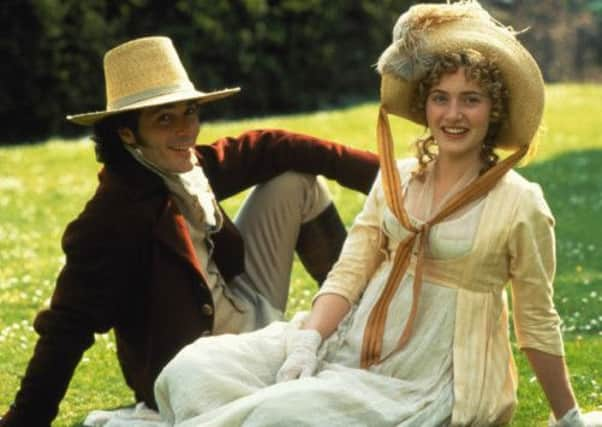Book review: Sense & Sensibility


SENSE & SENSIBILITY
JOANNA TROLLOPE
HarperCollins, 368pp, £18.99
Joanna Trollope’s often riotous reinvention of the Dashwood family saga has eldest sister Elinor turning one of Jane Austen’s classic scenes of sexually charged awkwardness on its head – the untimely arrival of a tongue-tied, lovelorn but compromised Edward Ferrars. It’s one of many moments in this contemporary romp where to spot the joke you really need to know the twists and turns of the original story.
The idea is a gamble. Trollope early on acknowledged the challenge of the “reimagining Austen” project. As the first author off the block (Val McDermid follows next spring with Northanger Abbey, and Curtis Sittenfeld’s Pride & Prejudice is scheduled for the autumn) she was called on to take an iconic novel about women in a man’s world 200 years ago and make it work today. Yet she seems to have been inspired rather than daunted by the task.
Advertisement
Hide AdTake the basics of the plot: “Belle” Dashwood and her daughters are turfed out of Norland Park into nouveau austerity Britain not simply because of the antiquated laws of primogeniture. The late Mr Henry Dashwood indeed had a son by his previous marriage, but the real problem was that he never got around to marrying Belle. It takes a delightfully remodelled, mouthy youngest daughter, Mags, to remind her mother and sisters of this fact while they’re sitting at the kitchen table drinking mugs of tea.
The women are only at Norland at all because of the late Henry’s bachelor uncle (also called Henry), who invited the young family to share his mansion 20 years ago and then almost failed to mention them in his will. He proved a traditionalist in the end; won over by the girls’ step-brother John, his ghastly wife Fanny and their darling little boy, the unfortunate Harry, now aged three. And no sooner had the news sunk in that Henry senior was leaving the whole pile to John, than Belle’s Henry was carried off in the night by an asthma attack.
Fanny wastes no time in taking over Norland, arriving unannounced in her 4x4 with the Romanian nanny in tow and getting the interior designers in for a total makeover, with flat-screen televisions installed above every Georgian mantelpiece. According to her weak-jawed husband, charged with giving Belle and the girls notice to leave, she has plans to turn the 15-bedroom country manor into an upmarket B&B. What John does with his time is never quite clear.
Transported to modern times, Trollope’s Sense & Sensibility, you can’t escape thinking, is a story about a lot of idle, vain people who ought to know better. In a post-2008 world where interest rates are low and the cost of living is rocketing, one has little patience for the arty Belle and – whisper it – just a little sympathy for her high octane, go-getting, crass but at least energised step-daughter-in-law.
Fanny’s favoured younger brother, Robert, the one who ends up marrying gold-digger Lucy Steele, is entertainingly resurrected as a flamboyant, champagne-swilling party organiser who is secretly gay.
Older brother Edward, heir to the family’s property fortune, who in their mother’s eyes ought to be marrying a scaffolding heiress and in his own ought to be keeping his promise to Lucy, wants to go into social work but his mother won’t let him so he loafs about in Devon instead. Colonel Brandon, a veteran of the 1990s Bosnian war and about the only thoroughly good sort, runs a home for veterans with drug and alcohol problems. A job for Ed – the social work equivalent of a Regency rural curacy – may be in his gift.
Advertisement
Hide AdAs for Marianne, the sister with sensibilities, she has inherited her father’s weak chest. Asthma doesn’t lend itself to romance in the way that a chill and a fever did in earlier times; still, she’s pretty convincing in other ways. She plays guitar, mooches about, longs for true lurve, and, when she thinks she’s found it with John “Wills” Willoughby, sets herself up for a scene of humiliation as excruciating as Austen’s original – with the added horror of it going viral on YouTube.
Career girl Elinor’s feelings for the “slightly needy” Edward anyway are rather harder to understand than in Austen’s version, partly because in his 21st-century incarnation he seems so spineless. There was a certain flawed heroism in being trapped by convention in 1813; in 2013 not breaking out just seems feeble. You find yourself sharing Elinor’s exasperation in that tongue-tied reunion scene. Fortunately (and a little unbelievably) Edward shows himself to be made of sterner stuff in the end.
Advertisement
Hide AdFor this reader, though, Ed should be out volunteering if he wants to get into a social work career, not getting tricked into an early engagement by a viperish airhead.
Elinor, who gives up her London architecture studies as if there’s no alternative, should have let the others move to John Middleton’s new-build “cottage” in Devon if they had to, and applied for a student loan, supplementing her income by working nights in a bar like everyone else in higher education these days. And Marianne, at 19, shouldn’t be being wooed by a military man almost twice her age.
None of these young people, in a modern, commitment-shy Britain should be thinking of marriage at all. But never mind all that. Trollope’s novel is clever, and very funny.